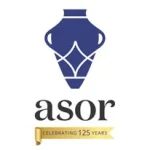
2024 NOMINEES FOR ASOR BOARD ELECTIONS
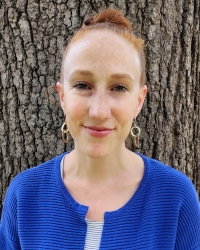
Helen Dixon
Helen Dixon serves as Assistant Professor of History at East Carolina University in the University of North Carolina system, where she teaches ancient Near Eastern, Greek, and Roman history, in addition to Public History and Museum Studies. As a specialist in Phoenician history, culture, and religion, she has conducted archaeological, museum, and archive research in Lebanon, Syria, Israel, Palestine, Jordan, Cyprus, Turkey, Malta, Egypt, and Tunisia. Her work on Phoenician sacred space was recognized by the J. Paul Getty Foundation, which named her 2021 Villa Residential Scholar, and she currently serves as public historian on both an NSF and NEH grant aimed at studying historic African American cemeteries in eastern North Carolina from a restorative justice perspective. Prior to her current appointment, she held positions as Assistant Professor of Religious Studies at Wofford College in South Carolina, as Postdoctoral Researcher in the Faculty of Theology at the University of Helsinki, and as Postdoctoral Teaching Fellow in the History Department at North Carolina State University, following her PhD in Near Eastern Studies (2013) from the University of Michigan.
Mission Statement: ASOR is my academic family. I have been an attendee since first sneaking in from SBL in 2007 (sorry Andy!) and have found support and mentorship here that was not always present in my home institution. Some of this support has been financial: I’ve been the recipient of ASOR student travel grants (2008 and 2009) and the Study of Collections Award (2023), and I have begun to give back to the organization as I am able. In terms of service to ASOR, I have chaired member-organized sessions periodically since the 2010 “Death and Burial in the Ancient Near East,” facilitated several standing sessions including “Archaeology of Lebanon,” and was an early member of the Junior Scholars (now Early Career Scholars) Committee, followed by serving as a member and then co-chair of the ASOR Program Committee (2016-2022), for which I was granted the ASOR Membership Service Award in 2022. I am fiercely devoted to ASOR even as I recognize that we suffer from the problems shared by many organizations who rely on donor support, government permits, very few (marvelous) staff, and lots of volunteer labor. My goal would be to push ASOR to be a more active ally to scholars, institutions, and regions that are doing excellent work without the financial and political assets that shape power in our field. I am especially interested in amplifying the work of our partners in the Middle East in places where we do not currently have an American research center, considering the work ASOR’s network already does as a group of dedicated scholar-administrators.
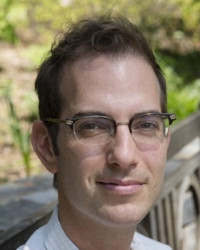
Asa Eger
Asa Eger is Professor of the Islamic World in the Departments of History and Ancient Mediterranean Studies and Archaeology at the University of North Carolina at Greensboro. His research focuses on Islamic and Byzantine history and archaeology of the eastern Mediterranean, with a focus on frontiers and the relationship between cities and hinterlands. He is the author of The Islamic-Byzantine Frontier: Interaction and Exchange Among Muslim and Christian Communities and co-author of Antioch: A History, both winners of ASOR’s G. Ernest Wright Book Award in 2015 and 2022. He has directed excavations and surveyed all around southeast Turkey since 2001, as well as Israel, Cyprus, and Greece. He currently co-directs excavations at Caesarea, Israel, surveys with the Kozkalesi Archaeological Project in the Hatay, and studies the 1930s Antioch collections at Princeton University and the 1970s survey material from the Tell Rifa’at Survey, the hinterland of Aleppo, at the Louvre.
He has been a member of ASOR for 20 years and served on the Program Committee for 6 of those years (2013-2019). He has co-chaired 4 multi-year sessions: “The Byzantine and Early Islamic Near East” (2006-2008), “Islamic Frontiers and Borders in the Near East and Mediterranean” (2011-13), “The Archaeology of Monasticism” (2014-16), “Islamic Seas and Shores: Connecting the Medieval Maritime World” (2021, 2023), plus “Field Schools in Practice: A Round-Table Discussion” (2019). He also has received the 2023 ASOR Stevan B. Dana Project Grant and Heritage Grant twice.
Mission Statement:
From my first ASOR meeting exactly 20 years ago, I have always felt a sense of belonging to this organization that serves many functions, but among them, a home away from our various temporary homes abroad, where we can continue the conversations left in the field. I love this organization for its intimacy. Small meetings without too many concurrent sessions and no job interviews make the annual conference a pleasure to attend. As compared to AIA or SAA, one can see this in the quality of papers and the strong ability for people to network – an essential component for archaeologists who conduct research largely through collaborative means. I feel strongly about maintaining these principles, but deepening and expanding the scholarship that ASOR supports both from within, through grants, publications, and meetings, and externally by encouragement and recruitment throughout the academic and public community.
If I were to give my vision of ASOR 8 years ago, I would have had a lot to say about reorganizing and reprioritizing the annual meetings and publications and grants to represent archaeologists working on all periods and breaking away from the traditional Biblical and Levant centered hold. However, ASOR has confidently evolved. My vision would be to maintain this breadth of scope even more comprehensively and in a balanced fashion. I would work to insure that these periods are adequately represented and spaced appropriately in the annual meetings within ASOR but also actively recruit scholars and students to present and publish with ASOR. Geographically, I would also insure that the Near East is more broadly defined and that cultural spheres in later periods (Roman, Byzantine, Islamic) included areas towards Central Asia, the Caucasus, North Africa, islands of the Mediterranean, and the Balkans. Shifting current political conflict poses challenges for fieldwork and such areas have opened up where others closer to the central lands have closed. I would love to see dialogue across individual periods and regions. Diachronic studies of single regions framed by landscape, environment, and settlement; comparisons on the role of empires and other political systems, trans-spatial examinations of interregional trade are but a sampling of potential original research that advances how we envision the Near East and truly benefit from one another’s work by stepping outside of our individual fields. Apart from meetings, this can also manifest in ASOR becoming more financially active in helping new projects get underway and disseminating the breadth of its scholarship in academic and public circles.
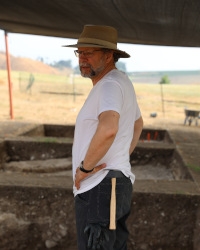
Paul Flesher
Paul Flesher began his academic career by studying the history and religion of Judaism and the ancient Near East with degrees from Rochester and Oxford before earning a PhD from Brown University. Currently, he is Professor of Religious Studies at the University of Wyoming and the director of the American Heritage Center, the nationally ranked archive where the ASOR records reside.
An expert in the Jewish writings of the Hellenistic and Roman eras, Paul draws upon archaeological and textual data to reconstruct the ancient past. In the early 1990s, he began working in scholarly partnerships to translate, edit and publish works that brought the two perspectives together.
In 1986, as a graduate student, Paul got involved with the Albright Institute of Archaeological Research in Jerusalem, and ultimately excavated at Tel Miqne, the Huqoq synagogue, and now Legio, home of Rome’s VI Legion. In 2016, he served as the Albright’s Seymour Gitin Distinguished Professor, and more recently as an ASOR trustee.
His research specialty focuses on synagogues, particularly those in Galilee, and the rites practiced in them. The excavated synagogue structures there provided the ritual locations for the Judaism described in and supported by the Roman-era Rabbinic writings. His publications include three written and nine edited volumes in addition to numerous articles. In recent years, Paul helped edit The Old Testament in Archaeology and History (Ebeling, et al., 2017) and he has been writing and speaking on the archeo-acoustics of ancient synagogues
Mission Statement: The heart of ASOR is field research. While its activities include publication, dissemination and education, everything starts with excavation. Covid and the ongoing war has significantly interfered with that. By 2025, our members will have been unable to dig for four of six years. How will we revive that activity and reinvigorate the discipline?
Our discipline and its future is shaped by our field research and the people who work with us and support us: our students, our colleagues, and our friends. Restarting excavation is not merely (!) a practical concern, but one of human connections and moral considerations. How will we re-enter a region where people are filled with fear, anger, hardship, and grief?
Our current excavation model relies heavily on undergraduates. Can we interest them in coming back, persuade them it is safe? Will it be safe? What about training new faculty-level practitioners in near eastern archaeology? They need experience to become competent excavators, gain skills in reading pottery and lithics, and hone their ability to lead an excavation—to say nothing of other skills and abilities.
ASOR will need to lead and provide guidance in this revival. Its research centers will need to provide on-the-ground assessment of circumstances. Its members will need to advise each other and shape our society’s approach. If elected a trustee, I will use my decades of experience on the ground to work with ASOR’s membership and leadership to negotiate the challenges facing our discipline and strive to bring about its renewal.
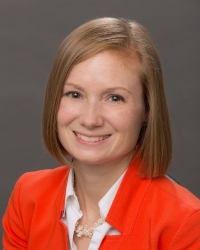
Emily Hammer
Emily Hammer is Assistant Professor of Archaeology and Digital Humanities at the University of Pennsylvania. She is an anthropological archaeologist interested in the development of urbanism and the history of mobile pastoralism in greater Mesopotamia, including the highland peripheries of the north and the alluvial plains of the south. She has surveyed and excavated in Iraq, Azerbaijan, Turkey, and the United Arab Emirates. Professionally she is known for her technical expertise in spatial analysis and both quantitative and visual analysis of remote sensing imagery, especially newly-declassified sources of archival imagery (including imagery from U-2 spy planes and Hexagon spy satellites). Her forthcoming book, The Archaeology of Pastoralism, Mobility, and Society: Beyond the Grass Paradigm (Cambridge, early 2025) weaves together often-segregated literature on Middle Eastern, African, and Central Asian pastoralism. As a participant in the global collaborative project “LandCover6K,” she works with other historians and archaeologists to reconstruct land use over the last 6000 years across southwest Asia for inclusion in models of long-term climate and anthropogenic land cover change. Emily holds a PhD in Anthropology from Harvard University (2012) and a BA both in Mathematics and Classical & Near Eastern Archaeology from Bryn Mawr College (2006).
Mission Statement:
ASOR has been central to my professional life from the beginning of graduate school continuing until today. I value the knowledge that I gain and the networks that I build at each annual meeting. In recent years I have contributed to the life of the organization through service on several standing committees, the Committee on Archaeological Research and Policy (CAP, two terms, including terms on the Fellowships Committee) and the Cultural Heritage Committee. I have further had the opportunity to participate in shaping ASOR’s evolving current directions through service on the Ad Hoc Committee on ASOR’s Name and the Ad Hoc Committee for ASOR’s Code of Conduct for Fieldwork Projects. Additionally, I co-chaired the “Landscapes of Settlement in the Ancient Near East” annual meeting session each year from 2015-2022. As a parent of young children, I have become active in efforts to make field archaeology and ASOR itself more friendly to those with caregiving responsibilities.
ASOR has grown tremendously in the 17 years that I have been a member, and I have been excited to witness it expand to include both a more diverse group of members and scholarship concerned with a broader geographic area. As a Board Member, I would advocate for initiatives that help sustain and capitalize on this growth in the diversity of our membership and research interests. Furthering the important work of existing ASOR committees such as Early Career Scholars, Diversity, Equity, and Inclusion, and Initiative on the Status of Women is key for ASOR to adapt to meet the sometimes-disparate needs of members with various goals at different career stages. I hope to advocate for more ASOR programming targeted at supporting members in challenges we all face with ever-changing workplace, classroom, and research funding environments, as all aspects of our professional lives are reshaped by AI and by declining resources for the humanities. As a primarily North American-based organization, I believe that we must do much more to encourage and support truly equal collaborative partnerships with our local colleagues abroad. We must continue to confront the colonialist legacies of our disciplines, recruit diverse students to our fields, and find creative ways to communicate our research to a broader audience—in part through digital innovations.
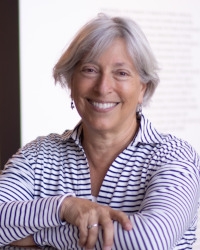
Andrea M. Berlin
Andrea M. Berlin is the James R. Wiseman Chair in Classical Archaeology at Boston University. She is an active field archaeologist who has been excavating in the eastern Mediterranean for over forty years, working on projects from Troy in Turkey to Coptos in southern Egypt to Paestum, in Italy. Her specialty is the Near East from the time of Alexander the Great through the Roman era, about which she has written/edited six books and over 70 articles. She is especially interested in studying the realities of daily life, and in exploring the intersection of political and cultural change in antiquity.
Andrea is the founder of the Levantine Ceramics Project, which began as a “light bulb” idea in 2011, and is now an established research tool with over 600 contributors from over 30 countries around the world.
She is a past winner of ASOR’s P.E. MacAllister Field Archaeology Award for outstanding contributions to ancient Near Eastern and Eastern Mediterranean archaeology. This year her contributions to the field were recognized by the Archaeological Institute of America, which awarded her the 2025 Gold Medal for Distinguished Archaeological Achievement.
Mission Statement: ASOR has been instrumental to my career from the start, beginning with the award of a Samuel H. Kress Pre-Doctoral Fellowship back in 1984. Over the many years since then, I have attended annual meetings, served on the board and as a member of CAP and COP, and published in its journals. I have watched with pleasure as ASOR’s intellectual vitality and professional footprint have continually expanded, solidifying its standing among the wider consortium of international scholarly organizations. ASOR has held fast to high standards in the dissemination of research while also broadening its sphere to accommodate an array of new initiatives, including especially ones focused on cultural heritage preservation and digital publication. Of the latter, the one closest to my heart is the Levantine Ceramics Project (LCP; levantineceramics.org), a crowd-sourced application devoted to archaeological ceramics covering 7000 years of life in the Levant. I founded the LCP in 2011; it now flourishes under the umbrella of ASOR projects. In common with all members and friends of ASOR, I believe that study of the history and archaeology of the Near East and eastern Mediterranean creates knowledge that is meaningful, valuable, and relevant to us today. I know that to ensure ASOR’s continued ability to support that study, we must all contribute as we can to the organization and its mission. As a member of the Board of Trustees, I hope to pay back some of what ASOR has done for the field and for me, and to help keep it strong for the next generation of scholars and students.
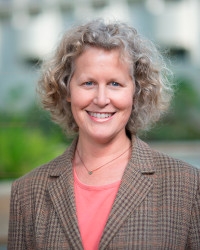
Lynn Swartz Dodd
Lynn Swartz Dodd is Professor of the Practice of Religion and Spatial Sciences at the University of Southern California’s Dornsife College of Letters, Arts and Sciences. She serves as Director of the Archaeology Research Center and Extended Reality Lab, and Director of the Interdisciplinary Archaeology Undergraduate Program. She has been designated as a USC Dornsife Distinguished Faculty Fellow and received a Mellon Mentoring Award.
Dodd’s research centers on archaeology and politics, particularly the ways that beliefs about the past are visible in tangible materials or socio-political change. As Curator of USC’s Archaeology Research Center, she is engaged in technical material studies, provenance research, and the development of virtual experiences that support both preservation and wider access to heritage materials. As a grad student, she worked in archaeological projects on land in Egypt and Syria, and underwater in Oman. She then spent more than a decade working in southeastern Turkey on surveys and excavations, including Kenan Tepe in the upper Tigris River region. She is advancing publication of the University of Chicago’s excavations at Tell al-Judaidah (Amuq).
Mission Statement: I have had the honor of serving ASOR for two terms as Secretary of the Board of Trustees, for multiple terms on the Committee on Archaeological Policy, the Committee on Publications, as Chair of CAP’s Fellowships Committee, and as Chair of the Ad Hoc Ethics Working Group during the time when ASOR developed its first holistic professional conduct policy. Presently, I serve on the Finance Committee, Cultural Heritage Committee, and Trustee Development Committee.
I understand ASOR’s significant growth as a reflection of the generosity and commitment of our members to research, publication, inspiring teaching, public communication, and transformative heritage projects. I support ASOR’s on-going efforts to encourage diversity of participation and perspectives and to be a civil forum in which scholars and others from a wide geographic area of interaction can engage and learn from one another.
I serve as the Institutional Representative at the University of Southern California. As an Institutional Representative to the ASOR Board of Trustees, I am committed to enhancing the visible, reciprocal benefits for Institutional and Individual ASOR members. I will encourage ASOR to pursue initiatives that support relevance, diversity, mutual respect, and expanded professional opportunities for ASOR members, including partnerships with non-profits and other organizations that amplify ASOR members’ efforts in research, documentation, publication, and community heritage investment. I will continue to support ASOR personally
with financial resources while I also encourage others to support ASOR’s mission as Chair of the Development Committee. I want to see expanded resources available to all our members for the support of impactful heritage projects, novel research, and wider public understanding of the history and cultures of the Near East and wider Mediterranean.
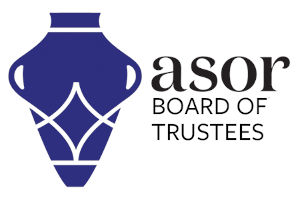 Trustee Nominations Committee has selected six highly qualified members to stand for election for four open positions on the Board of Trustees. The Board sets the direction for ASOR and provides oversight for our organization. Among other responsibilities, members of the Board agree to attend two meetings each year, to participate thoughtfully in the governance process, and to contribute financially to ASOR.
Trustee Nominations Committee has selected six highly qualified members to stand for election for four open positions on the Board of Trustees. The Board sets the direction for ASOR and provides oversight for our organization. Among other responsibilities, members of the Board agree to attend two meetings each year, to participate thoughtfully in the governance process, and to contribute financially to ASOR.